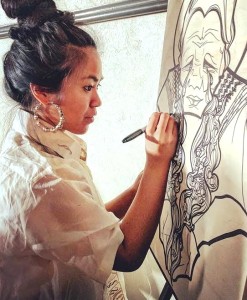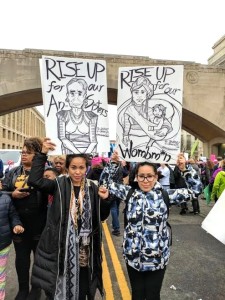She ‘decolonizes’ the self with art
Born and raised in Honolulu, in a place where almost everyone had a striking similarity to her, Jana Lynne Umipig is a Filipino American, and Ilocano is central to this identity. A multi-disciplinary artist with a master’s in theatre for communities and colleges at New York University, Jana, 30, is an active part of New York City art and theater scene. She literally wears her ancestry every day–a tattoo on her chest that tells the story of her life as a Filipina, and clothing like her “habing Iloko” wrap.
“It is important to me as an artist to use all my platforms of presence to speak and share my ancestry,” Jana explains.
Search for a better life
Jana’s mother is from Ilocos Norte while her father is from Ilocos Sur. Her widowed grandmother immigrated to Hawaii along with her five children, including Jana’s mother who was then in high school. Jana’s father came to America to study medical technology.
“My father was a farmer and rarely talks of his times in the Philippines. He left the Philippines with the hopes of providing for his family from the United States,” Jana says.
Growing up in Hawaii, Jana was surrounded by Ilocanos from all generations who spoke and practiced their cultural traditions. She understands Ilocano even though her parents discouraged their children from learning it as their first language. In high school she moved to Upland, California, where she felt different.
“I attended a school that was diverse but predominantly white affluent teens. I was taught by my family a sense of pride and honoring of self, so my identity was not detrimental,” Jana shares.
Duality is a migrant issue
Jana experienced the difficulties of “duality” living as a Filipino American. She realizes that her parents wanted her to assimilate and become a successful American, meaning economically well off. This was in contrast to what her parents taught to her indirectly, which was valuing a community and its traditions, treating everyone with compassion and a sense of interconnectedness, being generous and open and thankful.
“I have no ties in my heart to America. This is the land in which I live, but my identity is not rooted in what American culture stands for. I consider myself a settler–despite me not having chosen to be here. I find myself seeking to know and honor anything that I consume in the United States, and I have sought more and more to detach myself from the culture of consumerism that is not necessary to my needs and not supportive of my sacred work as an artist,” Jana explains.
Recently, Jana and her older sister went back to the Philippines to reconnect with their roots. Jana laments that her quest for connection to the Motherland was received with surprise because for many being an American is a privilege.
“The most difficult thing about returning home is understanding that I am not seen as purely Filipina but as an American,” Jana says.
Filipina creator in New York City
Jana has been interested in the arts for as long as she can remember. When she moved to New York City to study, she enhanced her skills, eventually holding exhibits, directing plays, designing, teaching and coaching students for auditions. She uses art as a medium for healing, education, understanding, empowerment and building community and connection. Jana also joins panel discussions on activism and social justice.
“What I would call myself rather than an artist and all these other roles, is a creator. I create and I create with, for, and am inspired by community always,” Jana explains.
She says New York is a place for anyone who has vision, drive and willingness to do work despite the challenges of resources and visibility. She also acknowledges that women artists are more visible now compared with the past decades.
Her most popular work includes the “The Journey of a Brown Girl,” “The Roots of Health,” and “Raised Pinay,” which was performed at the Philippine Consulate last year. Her visual art work includes the “My Skin Color is Not a Crime” Campaign through El Puente, #FromSpirittoInk (On Instagram), Live Art and Solo Exhibits around Pilipinx Identity, and Ancestry and Labor. She is working on a “Pilipinx inspired” tarot card deck and is blogging for HellaPinay.com
Decolonization
Jana believes her effort in the arts is gaining support from the Filipino community mainly due to her different approach, which is focused on “decolonization” and remembering indigenous and other Filipino traditions.
However, divisiveness in the Filipino community has led her to become more at home with Afro-Latino artists who share the same history of colonization with Filipinos. But understanding the complex layers of Filipino immigration in America has challenged her to continue promoting her art. She supports every Filipino function to establish connection. She is a core member of the Center for Babaylan Studies.
“I continue to create without need to be accepted, but rather with the intention to continuously invite all into the room, into the conversations, into the spaces of sacred exchange; and if they show up then they will receive,” Jana says.
Creation is a gift wherein the spirit speaks through us, she says. “When we honor our ancestry in our expressions, it becomes the way our ancestors’ spirits continue to beautify this existence. You are a cultural bearer. Use that gift to express from your heart. Let your work be free of colonial influence, see what emerges, see what is remembered and honor its magic.”




